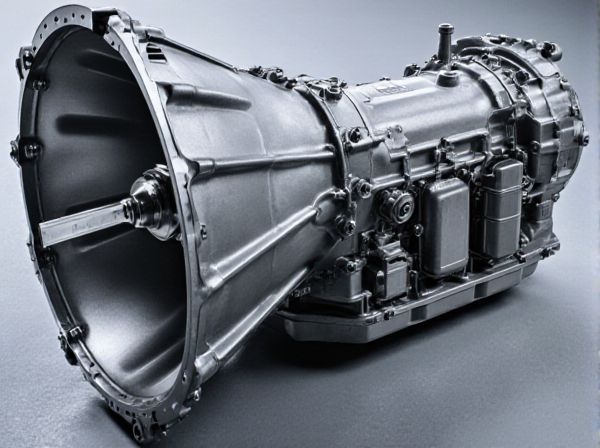
Photo illustration: Torque Converter Automatic vs Direct Shift Gearbox
Torque converter automatics use a fluid coupling to transfer engine power, offering smooth and seamless gear shifts ideal for comfortable driving. Direct Shift Gearboxes (DSG) employ dual clutches to pre-select gears, providing faster, more efficient gear changes and improved fuel economy. Understanding the differences between these transmissions helps you choose the right balance of performance and comfort for your vehicle.
Table of Comparison
| Feature | Torque Converter Automatic | Direct Shift Gearbox (DSG) |
|---|---|---|
| Operation | Hydraulic torque converter for seamless power transfer | Dual-clutch system enabling rapid gear shifts |
| Shift Speed | Slower, smoother shifts | Faster, almost instantaneous shifts |
| Fuel Efficiency | Moderate due to fluid coupling losses | High, minimizing power loss between shifts |
| Driving Experience | Smoother, comfortable for everyday driving | Sportier, performance-oriented feel |
| Complexity | Less complex, easier maintenance | More complex, higher maintenance demands |
| Cost | Generally lower initial cost | Typically higher due to advanced tech |
Introduction to Modern Automotive Transmissions
Modern automotive transmissions primarily utilize torque converter automatics and direct shift gearboxes (DSGs), each offering distinct mechanisms for power delivery. Torque converter automatics employ a fluid coupling to transfer engine power smoothly, providing seamless shifts and enhanced vehicle comfort. In contrast, DSGs use dual clutches for rapid, precise gear changes, improving fuel efficiency and acceleration performance.
Overview of Torque Converter Automatic Gearboxes
Torque converter automatic gearboxes use a fluid coupling to transfer engine power, providing smooth acceleration and seamless gear shifts without driver input. These systems excel in delivering enhanced torque multiplication and improved vehicle launch performance, especially at low speeds. Their hydraulic design ensures reliability and durability, making them widely favored in passenger vehicles and heavy-duty applications.
Understanding Direct Shift Gearboxes (DSG)
Direct Shift Gearboxes (DSG) utilize dual clutches to enable lightning-fast gear changes without interrupting power delivery, enhancing acceleration and fuel efficiency compared to Torque Converter Automatics. This advanced transmission system offers precise control and reduced mechanical losses by pre-selecting the next gear, making it ideal for sporty and performance-oriented vehicles. DSGs deliver seamless shifts and improved drivetrain responsiveness, contributing to a more engaging driving experience with reduced lag and smoother power transitions.
Key Differences: Torque Converter vs DSG
Torque Converter automatics use a fluid coupling mechanism that provides smooth power transfer and torque multiplication, enhancing low-speed drivability and comfort. Direct Shift Gearbox (DSG) employs dual-clutch technology, delivering lightning-fast gear shifts and improved fuel efficiency by minimizing power loss during gear changes. Torque Converter systems excel in smoothness and durability under varied conditions, while DSGs prioritize performance and responsiveness for sporty driving dynamics.
Performance Comparison: Acceleration and Shifting
Torque Converter Automatics provide smooth acceleration and seamless gear shifts by using hydraulic fluid to transmit power, which can sometimes result in slight lag during gear changes. Direct Shift Gearboxes (DSGs) enhance acceleration with faster, more efficient gear transitions through dual-clutch systems, minimizing power loss and delivering quicker response times. Performance-wise, DSGs typically offer superior acceleration and more precise shifting compared to Torque Converter Automatics, making them preferred in sporty and performance-focused vehicles.
Fuel Efficiency: Which Transmission Wins?
Torque converter automatics typically sacrifice fuel efficiency due to fluid coupling losses, whereas Direct Shift Gearboxes (DSG) deliver superior fuel economy by enabling quicker, more precise gear changes with minimal energy loss. DSG transmissions optimize engine power and reduce fuel consumption by maintaining closer gear ratios and offering smoother transitions between gears. In real-world driving conditions, vehicles equipped with DSG systems consistently outperform torque converter automatics in miles per gallon (MPG) ratings, making DSG the preferred choice for fuel-conscious drivers.
Driving Experience and Responsiveness
Torque converter automatics provide smooth and seamless shifts ideal for comfortable city driving but often exhibit slight lag in throttle response. Direct Shift Gearboxes (DSG) deliver faster, more precise gear changes with minimal power interruption, enhancing acceleration and responsiveness on varied terrains. Drivers seeking a sporty, engaging experience benefit from DSG's sharp shifts, while torque converters prioritize effortless cruising and noise reduction.
Reliability and Maintenance Considerations
Torque converter automatic transmissions are known for their durability and smooth operation but often require frequent fluid changes and potential rebuilds due to complex hydraulic components. Direct Shift Gearboxes (DSG) offer faster gear shifts and improved fuel efficiency with fewer moving parts, leading to generally lower maintenance costs, though clutch pack wear can necessitate periodic servicing. Reliability in torque converters benefits from established technology and robust construction, while DSGs demand attentive maintenance schedules to prevent costly repairs associated with dual-clutch wear.
Suitability for Different Driving Conditions
Torque converter automatics excel in stop-and-go urban driving due to their smooth engagement and ability to absorb engine vibrations, making them ideal for city traffic and varied speed conditions. Direct shift gearboxes (DSG) provide quicker, more efficient gear changes that enhance performance and fuel economy, especially suited for highway cruising and spirited driving. Each transmission type offers unique advantages tailored to specific driving environments, with torque converters favoring comfort and DSGs optimizing responsiveness.
Conclusion: Choosing the Right Transmission for You
Torque Converter Automatic transmissions offer smooth shifting and excellent torque multiplication, making them ideal for comfort-focused driving and towing capabilities. Direct Shift Gearboxes (DSG) provide rapid gear changes and greater fuel efficiency, appealing to those seeking a sportier and more responsive driving experience. Selecting the right transmission depends on prioritizing either driving comfort and durability or performance and efficiency tailored to your specific vehicle use.
 caratoz.com
caratoz.com